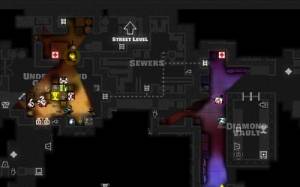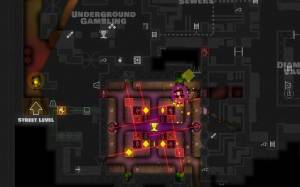
Stealth games have always had one major problem for me: when you’re caught, you’re dead. This makes sense, in a way – if your character was strong enough, or well-equipped enough, to battle enemies directly, what would be the point of stealth? But it still turns every mission into a seen-once-and-it’s-time-to-reload pain in the butt. Even if the game doesn’t kill you, it penalizes you, dropping your rank or cutting you off from the ‘best’ route.
Meaning that, for someone trying to get the most out of their game, it’s time to reload. Some games manage to straddle the line here – Deus Ex for instance, allows for stealth, but doesn’t penalize the player for breaking it. Dishonored is similar, with your player equally skilled at sneaking and fighting. However, kills in that game ding your karma meter, thus, for those pursuing Dishonored’s best ending, being seen means you have to hit the Quickload button.
Monaco is different. It’s a top-down stealth game, where up to four players control a team of thieves as they infiltrate highly guarded installations in the interest of robbing them blind. And while getting seen by a guard (who respond to interlopers with violence in greater or lesser degrees) is never optimal, it’s also not the end of the world. The game pulls this off by doing something counter-intuitive to the current thinking on games: it makes the guards less intelligent.

Why Dumb is Smart
For years, game designers have been striving to make the artificial intelligence (which is quite the glorified name for what is, in most cases, a series of nested IF-THEN statements) in their games more sophisticated, more lifelike. This is all well-and-good for some games, where an AI with sophisticated tactics and advanced psychology can push the player to a more exciting and interesting strategy. But in a game like Monaco, actively intelligent guards would cripple the experience.
Not to say that the Monaco guards are dumb. In a limited situation, they can act quite intelligently. They investigate loud noises, they look for your last reported location, and they patrol diligently. But they lack what we call, in infants, object permanence. If they’re given time to calm down, to lose your scent, then they forget that an intruder was ever present. It wipes the slate clean after a mistake. And that’s what saves Monaco from the constant Quicksave/Quickload routine of so many other stealth games.

When a player raises an alarm in Monaco, they aren’t out of options the way they are in many stealth games. It’s at these moments the game bursts into life, as the dynamic music system (which responds to player action with variations on the game’s lovely, atmospheric piano tracks) turns up the tempo of the music, and shots begin ringing out. The player knows they only need to get out of sight for a few seconds to be safe. That might mean rounding a corner, or ducking into a bush, or slowly opening a maintenance hatch. If they make it, heart pounding, they only have to wait for a few seconds for the level to calm down again, for the guards to return to their normal patterns, none-the-wiser. If they fail, they’re dead. The game forgives the player for the mistake, and play can continue with no further consequences.
None of this means Monaco is EASY. It can be brutally hard, especially if players are determined to collect every piece of loot in the level (which the game incentivizes by keeping a running tally of money left). A character’s death can be recovered from if their teammates are alive. But if all players are dead, the level is failed, and the players return to the mission screen, all progress lost. There is a difference between forgiving of mistakes and being unwilling to punish them.

Like Superheroes, But With Stealing
Still, this forgiving environment gives the player a chance to explore and learn the nuance of each of the game’s characters. Each has a set of semi-hidden stats (how quickly they open doors, how quickly they hack into computers to disable security measures, etc.) that must be learned with time, and a super-power that will be necessary for them to get in, get the money, and get out alive. The Cleaner can disable guards with a minimum of noise, but is largely helpless against machines. The Pickpocket has a monkey that allows him to grab money without exposing himself. The Mole can dig through almost every surface, at the risk of alerting guards with his digging. Each class is balanced so that the player can bypass some, but not ALL of the level’s hazards on their own (which is a reason the game’s single-player mode is somewhat lackluster). Teamwork is a necessity and the ways the classes’ abilities interact with each other is a delight to behold. An example: a guard stands vigilant at the end of a hallway. A direct approach will mean, the use of valuable resources and unnecessary noise. Instead, the Mole digs through a wall behind him, the noise causes the guard to turn his back, and the Cleaner deftly renders him unconscious. The 8 available characters allow for a plethora of these kinds of synergies for teammates to discover.

All of this is made easier by the game’s wonderful visual and sound design. The clear transmission of information to the player is a vital part of a stealth game, and Monaco does it perfectly, with clear visual and sonic clues for guard movements, security devices, and all of the game’s other elements. Combined with an interesting, twisty plot, some great dialogue, online leader-boards that encourage players to find the fastest ways to clear levels, and a robust level editor, it makes for one of the best games of the year.
But it’s the forgiving nature of its stealth, the ability to recover from mistakes without feeling like you’ve wasted your (or your teammates) time with a little bit of quick thinking and quick movement, that makes it one of the best stealth games ever made.
![We love PC Games [Explain & Conquer]](https://pcplayerhub.com/wp-content/uploads/cropped-logo-1.png)





